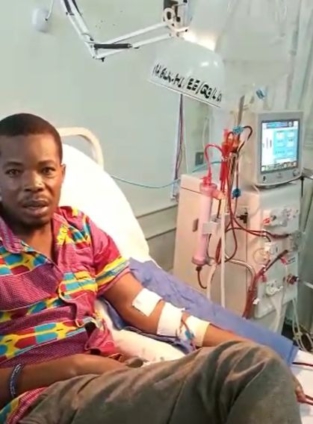A 37- year-old trained teacher, Francis Aduna in the Volta Region is fighting for his life as a result of end-stage chronic kidney disease.
Mr Aduna who has been on a bi-weekly dialysis for the past seven months lacks funds to continue with process.
The young man who spends over thousand cedis on the dialyses weekly said the issue started when he had stomach upset and was rushed to the Sogakope government hospital only to be diagnosed with kidney disease. The condition was also confirmed at the Ho Teaching Hospital.
In an interview with JoyNews, he narrated how he constantly endures severe pains and has appealed to the general public to come to his aid in order to get a cure.
“I was diagnosed of kidney failure and my family and I have spent all we had on dialyses. Now we don’t have money and the pain is excruciating. I need financial help urgently to save my life, “Aduna pleaded
His friend and colleague who has been with him from the day he was diagnosed , Johnson Bessah Dogbey said his friend situation is now critical and so needs urgent help from the public to save his life
“We are pleading with everyone to help us save the life of our friend who is always in pains due to the disease. We don’t have money to continue with the dialyses, please help us,” Dogbey cried.
Complete and irreversible kidney failure is sometimes called end-stage renal disease, or ESRD.
When the kidneys stop working completely, your body fills with extra water and waste products. This condition is called uremia. At this stage, one will need to undergo dialysis or kidney transplant.
Your hands or feet may swell and you will feel tired and weak because your body needs clean blood to function properly.
Untreated uremia may lead to seizures or coma and will ultimately result in death.
What is Dialysis?
The two major forms of dialysis are hemodialysis and peritoneal dialysis.
In hemodialysis, the patient’s blood is passed through the dialysis machine which has filter that removes waste products.
The clean blood is then returned into the body. Hemodialysis is usually performed at a dialysis center three times per week for 3 to 4 hours at a time.
Meanwhile, peritoneal dialysis involves surgery to implant a peritoneal dialysis (PD) catheter into your abdomen. The catheter helps filter blood through the peritoneum, a membrane in your abdomen.
During treatment, a special fluid called dialysate flows into the peritoneum. The dialysate absorbs waste. Once the dialysate draws waste out of the bloodstream, it’s drained from the abdomen.
Latest Stories
-
Ken Ofori-Atta’s lawyers are dictating the pace – Baffour Awuah tells OSP
31 minutes -
Environmental Protection Authority readies to ban plastic in Ghana
48 minutes -
Don’t rely on Ken Ofori-Atta to incriminate himself – Manhyia South MP tells OSP
50 minutes -
These Americans are done with Trump. So they’re leaving America
1 hour -
Emirates and Air China ink MoU to explore enhanced partnership
2 hours -
OSP flew out to meet Samuel Mahama; same approach should apply to Ken Ofori-Atta – Baffour Awuah
2 hours -
‘Ken Ofori-Atta is not a fugitive’ – Prof Ansa-Asare
2 hours -
Suicide bomber killed in Uganda on Christian holy day, army says
3 hours -
Harvey Weinstein used Hollywood clout to abuse women, prosecutor tells jury
3 hours -
Sean ‘Diddy’ Combs paid hotel security officer to hand over video, jury hears
4 hours -
Nigeria’s defence chief proposes fencing borders to curb insecurity
4 hours -
Local firms drive new growth phase in Nigeria’s oil sector
4 hours -
Mali suspends artisanal gold mining activities due to weather conditions
4 hours -
UK temporarily spared from Trump’s 50% metal tariffs
4 hours -
South African court dismisses opposition party’s fuel levy challenge
4 hours

